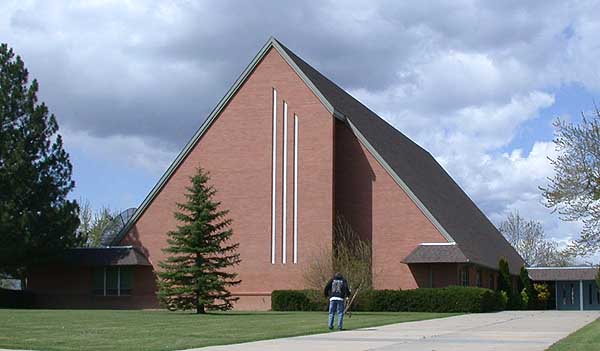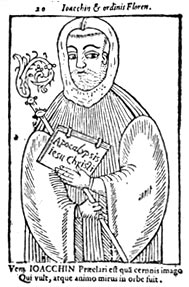|
M. L. Andreasen
Milian Lauritz Andreasen (June 4, 1876 – February 19, 1962), was a Seventh-day Adventist theologian, pastor and author. He was one of the Seventh-day Adventist church's most prominent theologians during the 1930s and 1940s. Andreasen held to the belief that Christians can overcome sin, known popularly as Last Generation Theology, controversial for its views on atonement and salvation. Andreasen became well known for his protests against Seventh-day Adventist church leaders during the last years of his life. Biography Andreasen served as president of the Greater New York Conference (1909 - 1910), president of Hutchinson Theological Seminary (1910 - 1918), dean of Atlantic Union College (1918 - 1922), dean of Washington Missionary College (now Washington Adventist University) (1922 - 1924), president of the Minnesota Conference (1924 - 1931), president of Union College, Nebraska (1931 - 1938), and field secretary of the General Conference (1941 - 1950). He taught at the Seve ... [...More Info...] [...Related Items...] OR: [Wikipedia] [Google] [Baidu] |
Seventh-day Adventist Church
The Seventh-day Adventist Church (SDA) is an Adventist Protestant Christian denomination which is distinguished by its observance of Saturday, the seventh day of the week in the Christian (Gregorian) and the Hebrew calendar, as the Sabbath, its emphasis on the imminent Second Coming (advent) of Jesus Christ, and its annihilationist soteriology. The denomination grew out of the Millerite movement in the United States during the mid-19th century, and it was formally established in 1863. Among its co-founders was Ellen G. White, whose extensive writings are still held in high regard by the church. Much of the theology of the Seventh-day Adventist Church corresponds to common evangelical Christian teachings, such as the Trinity and the infallibility of Scripture. Distinctive eschatological teachings include the unconscious state of the dead and the doctrine of an investigative judgment. The church emphasizes diet and health, including adhering to Jewish dietary l ... [...More Info...] [...Related Items...] OR: [Wikipedia] [Google] [Baidu] |
Pacific Press
The Pacific Press Publishing Association, or Pacific Press for short, is the only remaining Seventh-day Adventist publishing house in North America, following its absorption of Review & Herald in 2014. It was founded in 1874 by James White in Oakland, California, and is now located in Nampa, Idaho. Its titles include theological works as well as books on topics such as vegetarianism and home schooling and owns its own printing operation. It is owned by the North American Division of the Seventh-day Adventists. History Establishment in California The Seventh-day Adventist Church was formally organized and named in 1863. It began to realize its great mission to go into all the world and preach the gospel. Consequently, Elders J. N. Loughborough and D. T. Bourdeau came to California in 1866, and by May 1871, there were 130 Adventists in California in the San Francisco and Santa Rosa areas. Late in 1872, James and Ellen White and their two sons, Willie and James Edson, came to ... [...More Info...] [...Related Items...] OR: [Wikipedia] [Google] [Baidu] |
Inspiration Of Ellen White
Most Seventh-day Adventists believe church co-founder Ellen G. White (1827–1915) was inspired by God as a prophet, today understood as a manifestation of the New Testament "gift of prophecy," as described in the official beliefs of the church.SDA Fundamental Beliefs Her works are officially considered to hold a secondary role to the Bible, but in practice there is wide variation among Adventists as to exactly how much authority should be attributed to her writings. With understanding she claimed was received in visions, White made administrative decisions and gave personal messages of encouragement or rebuke to church members. Seventh-day Adventists believe that only the Bible is sufficient for forming doctrines and beliefs, a position Ellen White supported by statements inclusive of, "the Bible, and the Bible alone, is our rule of faith". Views Supportive views: *Infallible, inerrant or verbal dictation. Some Historic Adventists in the church argue that she is inerrant. V ... [...More Info...] [...Related Items...] OR: [Wikipedia] [Google] [Baidu] |
Sabbath In Seventh-day Adventism
The seventh-day Sabbath, observed from Friday evening to Saturday evening, is an important part of the beliefs and practices of seventh-day churches. These churches emphasize biblical references such as the ancient Hebrew practice of beginning a day at sundown, and the Genesis creation narrative wherein an "evening and morning" established a day, predating the giving of the Ten Commandments (thus the command to "remember" the sabbath). They hold that the Old and New Testament show no variation in the doctrine of the Sabbath on the seventh day. Saturday, or the seventh day in the weekly cycle, is the only day in all of scripture designated using the term Sabbath. The seventh day of the week is recognized as Sabbath in many languages, calendars, and doctrines, including those of Catholic, Lutheran, and Orthodox churches. It is still observed in modern Judaism in relation to Mosaic Law. In addition, Oriental Orthodox, specifically the Orthodox Tewahedo Churches are known to observe ... [...More Info...] [...Related Items...] OR: [Wikipedia] [Google] [Baidu] |
Historicism (Christian Eschatology)
In Christian eschatology, historicism is a method of interpretation of biblical prophecies which associates symbols with historical persons, nations or events. The main primary texts of interest to Christian historicists include apocalyptic literature, such as the Book of Daniel and the Book of Revelation. It sees the prophecies of Daniel as being fulfilled throughout history, extending from the past through the present to the future. It is sometimes called the continuous historical view. Commentators have also applied historicist methods to ancient Jewish history, to the Roman Empire, to Islam, to the Papacy, to the Modern era, and to the end time. The historicist method starts with Daniel 2 and works progressively through consecutive prophecies of the book—chapters 7, 8 and 11—resulting in a view of Daniel's prophecies very different from preterism and futurism. Almost all Protestant Reformers from the Reformation into the 19th century held historicist views. Ove ... [...More Info...] [...Related Items...] OR: [Wikipedia] [Google] [Baidu] |
Christian Conditionalism
In Christian theology, conditionalism or conditional immortality is a concept in which the gift of immortality is attached to (conditional upon) belief in Jesus Christ. This concept is based in part upon another biblical argument, that the human soul is naturally mortal, immortality (" eternal life") is therefore granted by God as a gift. This viewpoint stands in contrast to the more popular concept of the "natural immortality" of the soul. Conditionalism is practically synonymous with annihilationism, the belief that the unsaved will be ultimately destroyed. Protestantism The British Evangelical Alliance ''ACUTE'' report states that conditionalism is a "significant minority evangelical view" that has "grown within evangelicalism in recent years". In the 20th century, conditional immortality was considered by certain theologians in the Eastern Orthodox Church. Proponents of conditional immortality ("conditionalists") point to and , where the Tree of Life is mentioned. It is ar ... [...More Info...] [...Related Items...] OR: [Wikipedia] [Google] [Baidu] |
Second Advent
The Second Coming (sometimes called the Second Advent or the Parousia) is the Christian and Islamic belief that Jesus Christ will return to Earth after his ascension to Heaven (which is said to have occurred about two thousand years ago). The idea is based on messianic prophecies and is part of most Christian eschatologies. In Islamic eschatology, Jesus (''ʿĪsā ibn Maryam'') is also believed to return in the end times. According to Islamic belief, he will descend from Heaven to defeat the false messiah (''al-Masih ad-Dajjal''), restore justice, and reaffirm monotheism. His return is regarded as one of the major signs of the Day of Judgment, and he is viewed as a revered prophet, not divine, in Islamic theology. Other faiths have various interpretations of it. Terminology Several different terms are used to refer to the Second Coming of Christ: In the New Testament, the Greek word ἐπιφάνεια (''epiphaneia'', appearing) is used six times to refer to the retu ... [...More Info...] [...Related Items...] OR: [Wikipedia] [Google] [Baidu] |
The Pillars Of Adventism
The Pillars of Adventism are landmark doctrines for Seventh-day Adventists. They are Bible doctrines that define who they are as a people of faith; doctrines that are "non-negotiables" in Adventist theology. The Seventh-day Adventist church teaches that these Pillars are needed to prepare the world for the second coming of Jesus Christ, and sees them as a central part of its own mission. Adventists teach that the Seventh-day Adventist Church doctrines were both a continuation of the reformation started in the 16th century and a movement of the end time rising from the Millerites, bringing God's final messages and warnings to the world. The Pillars of Adventism The early Adventists emphasized the concept of "present truth"—see (NKJV). James White explained, "The church asever had a present truth. The present truth now, is that which shows present duty, and the right position for us..." "Present truth is ''present'' truth, and not future truth, and the Word as a lamp shines brigh ... [...More Info...] [...Related Items...] OR: [Wikipedia] [Google] [Baidu] |
Investigative Judgment
The investigative judgment, or pre-Advent Judgment (or, more precisely, the pre-Second Advent Judgment), is a unique Seventh-day Adventist Church, Seventh-day Adventist Seventh-day Adventist theology, doctrine which asserts that the divine judgment of professed Christianity, Christians has been in progress since 1844. It is intimately related to the history of the Seventh-day Adventist Church and was described by one of the church's pioneers Ellen G. White as one of the The Pillars of Adventism, pillars of Adventist belief. It is a major component of the broader Adventist understanding of the "heavenly sanctuary", and the two are sometimes spoken of interchangeably. Summary of the doctrine Biblical basis Seventh-day Adventists believe that texts such as Hebrews 8:1–Hebrews 8:2, 2 teach that the two-compartment design of the earthly sanctuary built by Moses, was in fact a model patterned after the Heavenly Sanctuary "which the Lord set up, not man." Hebrews 8:2 (Nasb bible, NASB). ... [...More Info...] [...Related Items...] OR: [Wikipedia] [Google] [Baidu] |
Prophecy In The Seventh-day Adventist Church
Seventh-day Adventists believe that Ellen G. White, one of the church's co-founders, was a prophetess, understood today as an expression of the New Testament spiritual gift of prophecy. Seventh-day Adventist believe that White had the spiritual gift of prophecy, but that her writings are a lesser light to the Bible, which has ultimate authority. According to the 28 Fundamentals the core set of theological beliefs held by the Seventh-day Adventist Church, states that Adventists accept the Bible as their only creed and can be read online on the website of the Seventh-day Adventist Church. The 18th of the 28 Fundamentals states the Adventists viewpoint on the Gift of Prophecy: According to one church document, "her expositions on any given Bible passage offer an inspired guide to the meaning of texts without exhausting their meaning or preempting the task of exegesis". In other words, White's writings are considered an inspired commentary on Scripture, although Scripture remai ... [...More Info...] [...Related Items...] OR: [Wikipedia] [Google] [Baidu] |
Biblical Research Institute
The Seventh-day Adventist Church (SDA) is an Adventist Protestant Christian denomination which is distinguished by its observance of Saturday, the seventh day of the week in the Christian (Gregorian) and the Hebrew calendar, as the Sabbath, its emphasis on the imminent Second Coming (advent) of Jesus Christ, and its annihilationist soteriology. The denomination grew out of the Millerite movement in the United States during the mid-19th century, and it was formally established in 1863. Among its co-founders was Ellen G. White, whose extensive writings are still held in high regard by the church. Much of the theology of the Seventh-day Adventist Church corresponds to common evangelical Christian teachings, such as the Trinity and the infallibility of Scripture. Distinctive eschatological teachings include the unconscious state of the dead and the doctrine of an investigative judgment. The church emphasizes diet and health, including adhering to Jewish dietary law, a ... [...More Info...] [...Related Items...] OR: [Wikipedia] [Google] [Baidu] |
History Of The Seventh-day Adventist Church
The Seventh-day Adventist Church had its roots in the Millerite movement of the 1830s to the 1840s, during the period of the Second Great Awakening, and was officially founded in 1863. Prominent figures in the early church included Hiram Edson, Ellen G. White, her husband James Springer White, Joseph Bates, and J. N. Andrews. Over the ensuing decades the church expanded from its original base in New England to become an international organization. Significant developments such the reviews initiated by evangelicals Donald Barnhouse and Walter Martin, in the 20th century led to its recognition as a Christian denomination. Foundations, 1798–1820s The Second Great Awakening, a revival movement in the United States, took place in the early 19th century. The Second Great Awakening was stimulated by the foundation of the many Bible Societies which sought to address the problem of a lack of affordable Bibles. The spread of Bibles allowed many who had not had one to be abl ... [...More Info...] [...Related Items...] OR: [Wikipedia] [Google] [Baidu] |




